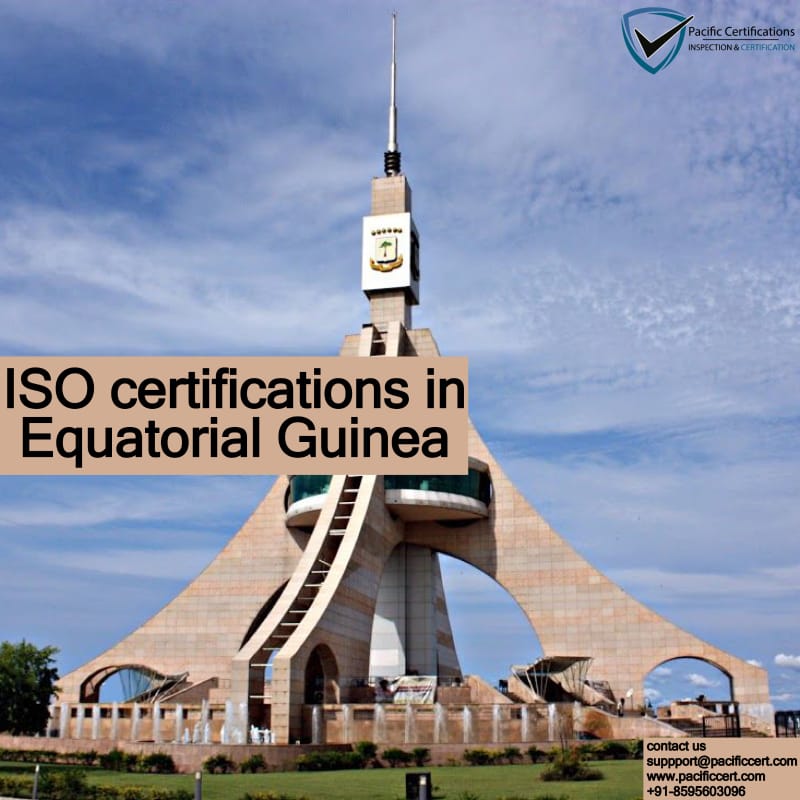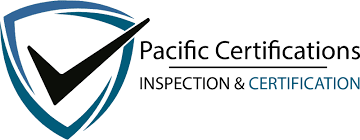ISO Certifications in Equatorial Guinea and How Pacific Certifications can help

Introduction
ISO certifications represent a cornerstone for organizations aiming to ensure quality, safety, efficiency, and environmental responsibility in their operations. For businesses in Equatorial Guinea, adhering to ISO standards can significantly enhance their competitiveness, both locally and globally.
Applicable ISO Standards for Equatorial Guinea
ISO 9001:
This is the international standard for quality management systems (QMS). It helps organizations ensure that they meet customer and other stakeholder needs within statutory and regulatory requirements related to a product or service.
ISO 14001:
This standard outlines the requirements for an effective environmental management system (EMS). It provides a framework for organizations to protect the environment and respond to changing environmental conditions in balance with socio-economic needs.
ISO 45001:
Focused on occupational health and safety (OH&S) management systems, this standard aims to reduce workplace risks and create better, safer working conditions worldwide.
ISO 27001:
This is the leading standard for information security management systems (ISMS). It helps organizations secure their information assets, such as employee details, financial information, or intellectual property.
Click here to find out more applicable standards to your industry
How Pacific Certifications Can Assist?
Audit and Certification Process
Gap Analysis:
We can begin by conducting a gap analysis to understand your organization's current position relative to the ISO standard's requirements. This step identifies areas that need improvement before a formal assessment.
Training:
Pacific Certifications provides training for your team on the specific ISO standards and the audit process. This can include internal auditor training and awareness training to ensure everyone understands the standards and how they apply to your organization.
Documentation Review:
Ensuring your documentation meets the ISO standards' requirements is critical. We at Pacific Certifications can assist in reviewing your documents to ensure they are comprehensive and compliant.
Pre-Assessment Audit:
Before the formal certification audit, a pre-assessment can be done to identify any areas of non-conformity and allow your organization to correct them.
Certification Audit:
The formal audit is conducted in two stages. The first stage assesses your documentation and readiness for the second stage, which involves a detailed examination of your organization's practices and processes to ensure they comply with the ISO standard.
Certification and Surveillance Audits:
Once certified, we will conduct surveillance audits, typically annually, to ensure ongoing compliance. This may also include a recertification audit every three years.
Achieving ISO certification in Equatorial Guinea can significantly enhance your organization's operational efficiency, marketability, and compliance with international standards.
Requirements of ISO Certifications in Equatorial Guinea
The requirements for obtaining ISO certification generally span across understanding the specific standards relevant to your organization, preparing your systems and processes, and undergoing an audit by a certification body. Here are common steps and considerations across most ISO certifications.
Understanding the ISO Standards
ISO 9001 (Quality Management System) Requirements:
This standard requires organizations to demonstrate their ability to consistently provide products and services that meet customer and regulatory requirements with a focus on continuous improvement.
ISO 14001 (Environmental Management System) Requirements:
Organizations must prove their commitment to environmental protection, reduction of pollution, and continuous improvement of their environmental performance.
ISO 45001 (Occupational Health and Safety Management System) Requirements:
This standard demands a clear demonstration of an organization's commitment to improving employee safety, reducing workplace risks, and creating better, safer working conditions.
ISO 27001 (Information Security Management System) Requirements:
Requires organizations to manage the security of assets such as financial information, intellectual property, employee details, or information entrusted by third parties.
General Requirements for ISO Certification in Equatorial Guinea
Commitment and Awareness
Leadership Engagement: Top management must be fully engaged and committed to the implementation of the management system.
Employee Awareness: Employees should be aware of the importance of the ISO standards and their role in the system.
Documentation
Documentation of Processes: Developing documentation that reflects your processes, policies, objectives, and the procedure for continuous improvement in alignment with the ISO standards.
Record Keeping: Efficient management of records to demonstrate compliance with the standards and continual improvement.
Implementation
Process Alignment: Aligning your organization’s processes with the requirements of the ISO standards.
Risk Management: Identifying, analyzing, and managing risks associated with your operations.
Internal Audits
Regular Audits: Conducting regular internal audits to assess the effectiveness of the management system and identifying areas for improvement.
Management Review
Review Sessions: Holding management review sessions to ensure the continuing suitability, adequacy, and effectiveness of the management system.
Continuous Improvement
Implementing a continuous improvement process, utilizing tools and methodologies like Plan-Do-Check-Act (PDCA) cycle.
Certification Audit
Stage 1 Audit: A preliminary audit to review your organization's documentation and readiness for the next step.
Stage 2 Audit: A more detailed audit to verify that your organization's management systems fully comply with the ISO standard.
The journey to ISO certification requires a comprehensive approach that involves the entire organization. From understanding and documenting processes to implementing systems and undergoing audits, each step is critical to achieving certification. We can provide the necessary guidance, support, and services to navigate the complexities of ISO certification in Equatorial Guinea, ensuring a smooth and successful certification process.
Benefits of ISO Certifications in Equatorial Guinea
ISO certifications in Equatorial Guinea offer a multitude of benefits for organizations operating within the country's unique economic and regulatory environment. These certifications are not just about meeting international standards; they are about enhancing organizational performance, gaining market access, and building a sustainable business.
Here's an in-depth look at the benefits of ISO certifications for businesses in Equatorial Guinea:
Enhanced Quality and Efficiency
Process Improvement: ISO 9001, for example, focuses on quality management systems that encourage organizations to analyze their processes, identify inefficiencies, and optimize operations. This leads to improved quality of products and services, which can significantly enhance customer satisfaction.
Consistency: Implementing ISO standards helps in standardizing processes across the organization, leading to consistency in the delivery of products or services. This consistency is key to building trust with customers and stakeholders.
Competitive Advantage
Market Differentiation: ISO certification can serve as a differentiator in competitive markets, including those within Equatorial Guinea. It signals to customers and partners that your organization adheres to internationally recognized standards.
Access to New Markets: Many global markets require ISO certification as a prerequisite for doing business. Certification can open doors to new opportunities abroad and within regional markets.
Regulatory Compliance
Ease of Compliance: Many ISO standards align with legal and regulatory requirements. Organizations can ensure compliance with local and international regulations by adhering to ISO standards, thereby minimizing legal risks.
Risk Management: Standards like ISO 27001 for information security management involve rigorous risk assessment processes, helping organizations identify and mitigate potential risks, including data breaches and IT security issues.
Environmental and Social Responsibility
Sustainable Practices: ISO 14001 encourages organizations to minimize their environmental impact and enhance environmental performance. This is increasingly important in Equatorial Guinea, where environmental conservation is tied to the country's economic and social wellbeing.
Health and Safety: ISO 45001 focuses on creating safer work environments, which is critical in industries prevalent in Equatorial Guinea, such as oil and gas, mining, and manufacturing. This not only helps in protecting employees but also reduces organizational liability.
Financial Performance
Cost Savings: By optimizing operations and reducing waste, ISO certifications can lead to significant cost savings. For example, efficient energy management systems (ISO 50001) can reduce energy costs, while quality management systems can decrease the costs associated with rework and defects.
Investment Attraction: Organizations that adhere to international standards are often viewed as more reliable and sustainable, making them more attractive to investors and financial institutions.
Enhanced Stakeholder Relationships
Trust and Credibility: Certification enhances an organization's credibility with customers, suppliers, and stakeholders by demonstrating a commitment to quality, security, and continuous improvement.
Employee Engagement: The process improvements and safety measures encouraged by ISO certifications can lead to higher employee satisfaction, which in turn can enhance productivity and retention.
Customization and Flexibility
Applicability Across Industries: ISO standards are designed to be applicable across various industries, allowing for customization and flexibility in implementation. This means organizations in Equatorial Guinea, from the burgeoning energy sector to small and medium-sized enterprises, can find relevant standards that fit their specific needs.
For organizations in Equatorial Guinea, ISO certification is not just about adhering to a set of standards; it's about fundamentally enhancing the way they operate. The benefits extend beyond compliance, touching on every aspect of the business from operational efficiency to market competitiveness and environmental stewardship.
Which industries need ISO Certifications in Equatorial Guinea?
ISO certifications are versatile and beneficial across a wide range of industries worldwide, including those in Equatorial Guinea. The need for ISO certifications in specific industries often depends on the sector's regulatory environment, market demands, and internal objectives related to quality, safety, environmental management, and information security.
In Equatorial Guinea, where the economy is significantly influenced by the oil and gas sector, alongside growing industries such as agriculture, fishing, and services, ISO certifications can play a pivotal role in enhancing operational efficiencies, compliance, and marketability.
Here are some industries in Equatorial Guinea that particularly benefit from ISO certifications:
Oil and Gas
ISO 9001 for Quality Management Systems ensures that companies in this sector can meet the strict quality standards required for their products and services.
ISO 14001 helps manage environmental impacts, which is crucial for this industry given its potential for significant environmental risks.
ISO 45001 is vital for ensuring occupational health and safety in an industry known for high-risk environments.
Agriculture and Fishing
ISO 22000 or ISO 9001 certifications can help these sectors by ensuring food safety and quality management systems are in place, essential for both local consumption and international trade.
ISO 14001 can demonstrate a commitment to environmental management and sustainability in operations, appealing to eco-conscious consumers and partners.
Manufacturing
ISO 9001 certification can help manufacturing businesses improve their efficiency and product quality, essential for competitiveness both locally and in global markets.
ISO 14001 and ISO 45001 can also be crucial for managing environmental impact and ensuring workplace safety in manufacturing facilities.
Banking and Financial Services
ISO 27001 is critical for information security management, ensuring that financial institutions protect customer data and manage risk effectively.
ISO 22301 for Business Continuity Management helps these institutions prepare for, respond to, and recover from disruptive incidents.
Tourism and Hospitality
ISO 9001 can enhance customer satisfaction by ensuring high-quality services in hotels, restaurants, and tour operations.
ISO 14001 certification can appeal to eco-conscious tourists by demonstrating a commitment to sustainable environmental practices.
Healthcare
ISO 9001 helps healthcare providers improve their quality management systems, enhancing patient care.
ISO 27001 is essential for protecting patient data, while ISO 45001 ensures a safe working environment for healthcare workers.
Construction
ISO 9001 for quality, ISO 14001 for environmental management, and ISO 45001 for occupational health and safety are all critical certifications that can help construction companies ensure compliance, efficiency, and safety.
Education and Training
ISO 9001 can help educational institutions and training providers improve their service quality, enhancing student satisfaction and outcomes.
Virtually any industry in Equatorial Guinea can benefit from ISO certification, not only to meet regulatory requirements and improve operational efficiencies but also to enhance competitiveness and marketability.
Conclusion
Whether an organization is looking to expand into new markets, improve its environmental footprint, ensure the safety of its employees, or protect sensitive data, ISO certifications provide a structured framework to achieve these goals.
Pacific Certifications is accredited by ABIS, in case you need support with ISO certification for your business in Equatorial Guinea , please contact us at [email protected] or +91-8595603096.
Ready to get ISO certified?
Contact Pacific Certifications to begin your certification journey today!
Suggested Certifications –
Read more: Pacific Blogs

